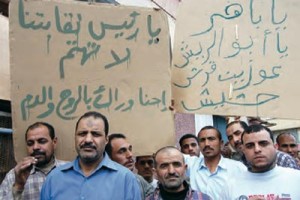By Azmi Ashour.
No one can have the lead role for good: this is the greater message of the ongoing Egyptian revolution, exemplified in the trial of Mohamed Morsi, writes Azmi Ashour
Egypt is not used to having former presidents, or former presidents on trial for that matter. But it is developing the taste.
Within less than three years, we managed to oust and then put on trial two presidents for very much the same set of offences.
Mohamed Morsi, a man who lasted in power for only one year, appeared in court on much the same charges that brought Hosni Mubarak, a man who stayed in office for 30 years, to justice before.
What this tells us is that Egyptian society, for all its deceptively simple appearance, is complex — though by now predictable — in its reactions.
Since the 25 January Revolution, this country has challenged a sequence of ruling elites, first bringing down the Mubarak coterie, then coming very close to defying the Supreme Council of the Armed Forces (SCAF) during the interim phase. The victory of the Islamists in parliamentary and presidential elections catapulted them to power, but their heavy-handed yet ineffectual policies triggered the widespread discontent that speeded up their ignominious demise.
In the first two years of the revolution, we grew accustomed to demonstrations and million-man marches. Still, no one saw coming the tumultuous wave of protests that ended Morsi’s rule.
Six months into the rule of Egypt’s first Islamist president, the writing was literally on the walls of his palace that were repeatedly surrounded by angry protests.
When the Tamarod movement managed to collect, within weeks, 22 million signatures demanding Morsi’s ouster, his fate was sealed.
On 30 June 2013, the nation took to the streets in force, led by an underestimated but indomitable middle class that had decided that enough was enough.
The scenes were familiar, but the numbers were unprecedented, and within days, Morsi — a man with limited ability to learn from the past — was in custody.
A new reality, one has to admit, was born in this country: a reality that is bigger than the political parties, stronger than the rulers, more alert than the elite, and yet resonant with the ideals of the revolution.
What this nation in more than one occasion made clear is that it wants true democracy, not the one that leads to monopoly by any political current. Politicians can rise and fall, but the ideals of the revolution will persist.
For a while, it seemed odd that SCAF would be demonised only a few months after it practically saved the 25 January Revolution. But even the most powerful army generals couldn’t outstay their welcome.
This was the lesson the Muslim Brotherhood failed to learn.
Their dismissive attitude, the haughtiness of their politics, and their holier-than-thou rhetoric antagonised the nation. And the cronyism that the Islamists quickly established, taken almost page for page from the book of the Mubarak regime, grated against public sensibilities.
A nation that has had enough didn’t grumble for long. In record time, it ended the rule of the Islamists.
This is a lesson to all. Political careers in this country can be made and unmade at an unprecedented rate. And even people who almost made it into office had their reputation shattered when they challenged the public mood. Mohamed Al-Baradei comes to mind, but he is not the only one.
The popularity of any given public figure, it seems, lasts only as long as he reflects the nation’s disposition. We had our share of popular faces at the onset of the revolution; then they receded into oblivion within months, or even weeks. The Ultras grabbed the headlines for a while, then the Black Bloc, and even the mighty Tamarod is now a shadow of its former self.
Such is the vitality of the revolutionary movement. Just as in an orchestra a performer cannot be allowed to improvise in the middle of a symphony, this nation is not allowing anyone to challenge its newly-found confidence.
This is the new law of this revolution: no one stays on top forever. No one can have the lead role for good.
This revolution is not about individuals, but about the whole nation, and all those ideals for which many young lives were cut short.
SCAF belatedly got the message, and just in time as it turned out. But its Muslim Brotherhood successors were too complacent, or perhaps thick headed, to see what was going on.
The current set of rulers is put on notice too. Today’s leaders must have the foresight to accommodate the new dynamic in this country.
No public figure is sacred; only the ideals of the revolution are. This is what the trial of Morsi is all about.
When Morsi and his top aides stood in the dock on 4 November 2013, theirs was not just a tragic case. Their sad reality wasn’t just the bitter fruit of hubris. It is evidence that this nation cannot be hoodwinked anymore.
The writer is managing editor of the quarterly journal Al-Demoqrateya published by Al-Ahram.




